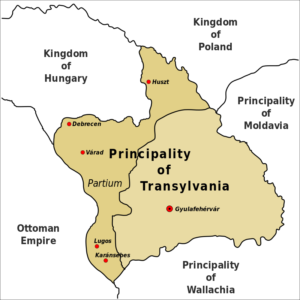Prince Báthory Kristóf of Transylvania (r. 1576-1581)


His brother, András, and their kinsman, Nádasdy Tamás, took charge of Kristóf’s education. While young, Kristóf had visited Germany, Spain, Italy, France, and even England. He also served as a page in Emperor Charles V’s court.
Kristóf entered the service of Szapolyai’s widow, Queen Isabella Jagiellon, in the late 1550s. At the time, Isabella administered the eastern territories of the Kingdom of Hungary on behalf of her son, János Zsigmond. She sent Kristóf to France in 1557 because she wanted to persuade King Henry II of France to help her to get three forts back from the Ottomans: Becskerek, Lippa, and Temesvár. As we know, the French and the Turks were allied against the Habsburgs at that time.

János Zsigmond (King Szapolyai’s son) took charge of the administration of Eastern Hungary (the future Transylvanian Principality) after his mother died on 15 November 1559. He retained his mother’s advisors, including Kristóf who became one of his most influential officials. After the rebellion of Balassa Menyhért, Kristóf persuaded János Zsigmond to fight for his realm instead of fleeing to Poland in 1562. Kristóf was one of the commanders of János Zsigmond’s troops during the ensuing war against the Habsburg rulers of the western territories of the Kingdom of Hungary, against Habsburg Ferdinand and Maximilian, who tried to reunite the kingdom under their rule. Kristóf defeated Maximilian’s commander, Lazarus von Schwendi, forcing him to lift the siege of Huszt castle in 1565.

After the death of (elected but not crowned) King János Zsigmond, the Diet of Transylvania elected Kristóf’s younger brother, Báthory István, voivode (or ruler) on 25 May 1571. István made Kristóf captain of Várad castle which was the most important military position. The following year, Sultan Selim II (who was the overlord of Transylvania), acknowledged the hereditary right of the Báthory family to rule the province. You can read more about the details of how it happened in the “interview” I made with Báthory István:

Báthory István was elected King of Poland on 15 December 1575. He adopted the title of Prince of Transylvania and made Kristóf voivode on 14 January 1576. An Ottoman delegation confirmed his appointment at the Diet in Gyulafehérvár in July. The sultan’s charter (or ahidname) sent to Kristóf emphasized that he should keep the peace along the frontiers. To help him, King István set up a separate chancellery in Kraków to keep an eye on the administration of Transylvania. The head of the new chancellery was Berzeviczy Márton, and he cooperated closely with Kristóf.

Kristóf’s first wife, Catherina Danicska, was a Polish noblewoman, but only the Hungarian form of her name is known. Their eldest son, Báthory Baltazár, moved to Kraków shortly after Báthory István was crowned King of Poland; he drowned in the Vistula River in May 1577 at the age of 22. Kristóf’s and Catherina’s second son, Nicholas, was born in 1567 and died in 1576.

During his reign, Anti-Trinitaruian preachers began to condemn the worshiping of Jesus in the Partium region and Székely Land in 1576, although the Diet had already forbidden all doctrinal innovations. Dávid Ferenc, the most influential leader of the Unitarian Church of Transylvania, openly joined the dissenters in the autumn of 1578. Kristóf invited Fausto Sozzini, a leading anti-Trinitarian theologian, to Transylvania to convince Dávid that the new teaching was erroneous. Since Dávid refused to obey, Kristóf held a Diet and the “Three Nations of Transylvania” (including the Unitarian delegates) ordered Dávid’s imprisonment. Kristóf also supported his brother’s attempts to strengthen the position of the Roman Catholic Church in Transylvania. He granted estates to the Jesuits to promote the establishment of a college in Kolozsvár on 5 May 1579.

Kristóf’s second wife, Bocskai Erzsébet, was a Calvinist noblewoman. She was the elder sister of Bocskai István (later Prince of Transylvania as well). Their first child, Krisztina aka Griselda, was born in 1569. (She was given in marriage to Jan Zamoyski, Chancellor of Poland, in 1583.) Kristóf and Erzsébet had four sons and a daughter. One of his sons was Zsigmond, later Prince of Transylvania who was born in 1573.

Kristóf fell seriously ill after his second wife, Bocskai Erzsébet, died in early 1581. After a false rumor about Kristóf’s death reached Istanbul, Pasha Koca Sinan proposed Transylvania to Márkházy Pál whom Kristóf had forced into exile. Although Kristóf’s only surviving son Zsigmond was still a minor, the Diet elected him as voivode before Kristóf’s death, because they wanted to prevent the appointment of Márkházy. Kristóf died in Gyulafehérvár on 27 May 1581. He was buried in the Jesuits’ church in Gyulafehérvár (Alba Iulia), the capital of Transylvania, almost two years later, on 14 March 1583.


Dear Readers, I can only make this content available through small donations or by selling my books or T-shirts.
If you like my writings, please feel free to support me with a coffee here:
You can check out my books on Amazon or Draft2Digital, they are available in hardcover, paperback, or ebook:
https://www.amazon.com/dp/198020490X
or at https://books2read.com/b/boYd81


My work can also be followed and supported on Patreon: Become a Patron!http://Become a Patron!





